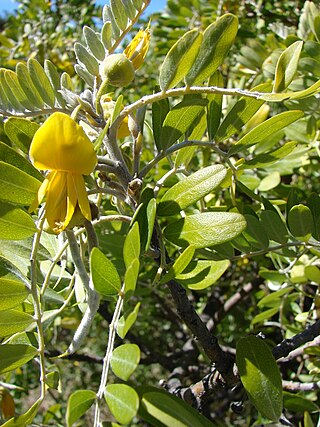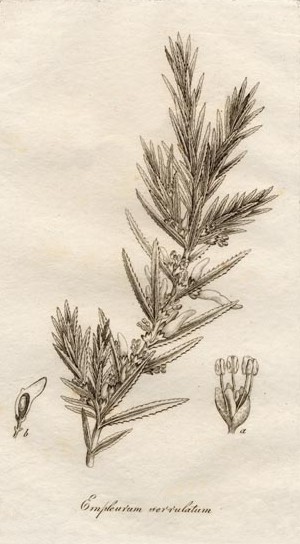
Anacardium, the cashews, are a genus of flowering plants in the family Anacardiaceae, native to tropical regions of the Americas. The best known species is Anacardium occidentale, which is commercially cultivated for its cashew nuts and cashew apples.

Fruit of the Loom is an American company that manufactures clothing, particularly casual wear and underwear. The company's world headquarters is in Bowling Green, Kentucky. Since 2002, it has been a wholly owned subsidiary of Berkshire Hathaway.

Sophora is a genus of about 45 species of small trees and shrubs in the pea family Fabaceae. The species have a pantropical distribution. The generic name is derived from sophera, an Arabic name for a pea-flowered tree.

Westfield College was a small college situated in Hampstead, London, from 1882 to 1989. It was the first college to aim to educate women for University of London degrees from its opening. The college originally admitted only women as students and became coeducational in 1964. In 1989, it merged with Queen Mary College. The merged institution was named Queen Mary and Westfield College until 2013, when the name was legally changed to Queen Mary University of London.

Syzygium is a genus of flowering plants that belongs to the myrtle family, Myrtaceae. The genus comprises about 1200 species, and has a native range that extends from Africa and Madagascar through southern Asia east through the Pacific. Its highest levels of diversity occur from Malaysia to northeastern Australia, where many species are very poorly known and many more have not been described taxonomically. One indication of this diversity is in leaf size, ranging from as little as a half inch to as great as 4 ft 11 inches by sixteen inches in Syzygium acre of New Caledonia.

Syzygium cumini, commonly known as Malabar plum, Java plum, black plum, jamun, jaman, jambul, or jambolan, is an evergreen tropical tree in the flowering plant family Myrtaceae, and favored for its fruit, timber, and ornamental value. It is native to the Indian subcontinent and Southeast Asia, including Myanmar, Sri Lanka, Bangladesh and the Andaman Islands. It can reach heights of up to 30 metres (98 ft) and can live more than 100 years. A rapidly growing plant, it is considered an invasive species in many world regions.

Apimondia or International Federation of Beekeepers' Associations promotes scientific, ecological, social and economic apicultural development in all countries and the cooperation of beekeepers` associations, scientific bodies and of individuals involved in apiculture worldwide. The name Apimondia is a compound word made from two words; api, referring to honey bees, and mondia, referring to the world.
Mondia was one of the most successful Swiss bicycle brands.

Ceratobasidium cornigerum is a species of fungus in the order Cantharellales. Basidiocarps are thin, spread on the substrate out like a film (effused) and web-like. An anamorphic state is frequently obtained when isolates are cultured. Ceratobasidium cornigerum is saprotrophic, but is also a facultative plant pathogen, causing a number of economically important crop diseases, and an orchid endomycorrhizal associate. The species is genetically diverse and is sometimes treated as a complex of closely related taxa. DNA research shows the species actually belongs within the genus Rhizoctonia.
Remix is a Danish 2008 feature film directed by Martin Hagbjer starring Micky Skeel Hansen as a 16-year-old pop singer Ruben. Remix is inspired by the true story of Danish pop idol Jon Gade Nørgaard known by the mononym Jon. Jon was also the subject of the documentary feature film Solo released in 2007. The film was released on 25 January 2008.
Globodera tabacum, commonly known as a tobacco cyst nematode, is a plant parasitic nematode that mainly infests the tobacco plant, but also plants in family Solanaceae.

Talan Skeels-Piggins is a Children’s Author, a double 600cc Motorcycle World Champion and Winter Paralympian - as part of the British Team alpine skier. Skeels-Piggins used a sit-ski in alpine competitions.

Katholm Castle is a manor house located on the Djursland peninsula, six km south of Grenaa, in eastern Denmark. Built in the Renaissance style from 1588 to 1591 and expanded in 1622, it is set on a castle bank in the middle of an artificial lake in a forested area. Wilhelm Dinesen, father of writer Karen Blixen, spent his childhood years at Katholm.

Boxwood blight is a widespread fungal disease affecting boxwoods, caused by Cylindrocladium buxicola. The disease causes widespread leaf loss and eventual death.

Periplocoideae is a subfamily of the dogbane plant family, Apocynaceae. It was not divided into tribes as of 2014.

Mondia whitei is a perennial herbaceous/woody climber belonging to the family Apocynaceae, and as with most members of this family, has milky latex. Two species of Mondia are recognised, the other being Mondia ecornuta. Known in Chichewa as 'gondolosi', in Kenya it is known as 'mukombero', the rootstock is often collected for medicinal use. It occurs at elevations of 1000 – 1500 m in moist to wet forests, and even in swampy grassland, across Sub-Saharan Africa; it is recorded from Guinea, Nigeria, Cameroon, the Sudan, Uganda, Kenya, Tanzania, Zimbabwe, Malawi, Mozambique, South Africa, Eswatini, and Angola. In Kenya its roots are heavily collected, and this often kills the plant. Some initiatives propagate the species to supply the commercial demand and attempt to re-establish the species in the wild.

Caroline Anne James Skeel was a British historian. She was a professor of history at Westfield College, and is remembered for her work in Welsh social and economic history. The library at Westfield was named after her in 1971.
The 1968 Tour de Suisse was the 32nd edition of the Tour de Suisse cycle race and was held from 14 June to 22 June 1968. The race started and finished in Zürich. The race was won by Louis Pfenninger of the Zimba–Mondia team.

Empleurum is a genus of flowering plants belonging to the family Rutaceae.














